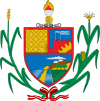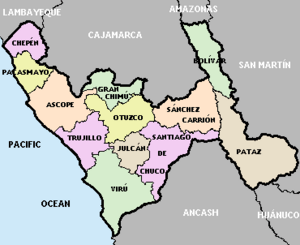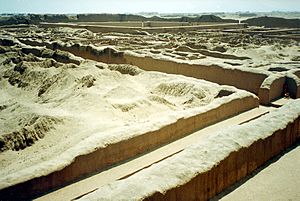Department of La Libertad facts for kids
Quick facts for kids
Department of La Libertad
Departamento de La Libertad (Spanish)
|
|||
|---|---|---|---|
|
|||
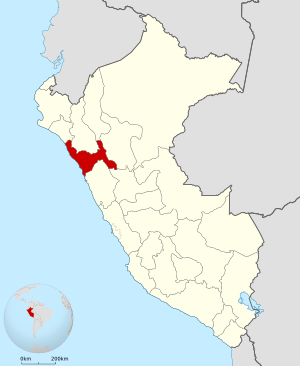
Location of the La Libertad Region in Peru
|
|||
| Country | Peru | ||
| Subdivisions | 12 provinces and 83 districts | ||
| Capital | Trujillo | ||
| Area | |||
| • Total | 25,499.9 km2 (9,845.6 sq mi) | ||
| Elevation
(Capital)
|
34 m (112 ft) | ||
| Highest elevation | 4,008 m (13,150 ft) | ||
| Lowest elevation | 0 m (0 ft) | ||
| Population
(2017)
|
|||
| • Total | 1,778,080 | ||
| • Density | 69.7289/km2 (180.5970/sq mi) | ||
| UBIGEO |
13
|
||
| Dialing code | 044 | ||
| ISO 3166 code | PE-LAL | ||
| Principal resources | Nation's largest sugar cane producer, and second-largest producer of rice. | ||
| Poverty rate | 52.1% | ||
| Percentage of Peru's GDP | 4.18% | ||
| Website | www.regionlalibertad.gob.pe | ||
La Libertad (which means The Liberty in English) is a region in northwestern Peru. It used to be called the Department of La Libertad. This region shares borders with Lambayeque, Cajamarca, and Amazonas to the north. To the east, it borders the San Martín Region. To the south, it borders Ancash and Huánuco. To the west, it meets the Pacific Ocean.
The capital city of La Libertad is Trujillo. It is the third-largest city in Peru. The region's main port is Salaverry, which is one of Peru's biggest ports. The name "La Libertad" was chosen to honor the area's fight for independence from Spain in 1820. La Libertad is the ninth smallest region in Peru. However, it is the second most populated region after Piura. It is also the second most densely populated region after Lambayeque.
Contents
How La Libertad Got Its Name
During the time when Peru was a Spanish colony, the area now known as La Libertad was part of a larger territory. This territory was called the Intendencía de Trujillo. It included parts of present-day Lambayeque, Piura, Tumbes, and even parts of Ecuador. All these areas were under the control of the city of Trujillo.
In 1825, after this area was the first to declare independence from Spain, the Peruvian government changed its name. They renamed it the Departmento de la Libertad. This name honored the idea of "freedom." More recently, Peru has changed how its government works. All former "Departments" are now called "Regions." These regions have elected governors and more power to make their own decisions.
Geography of La Libertad
La Libertad is special because it's the only region in Peru that has all three of the country's natural areas. These are the coast, the Sierra (highlands or mountains), and the selva (rainforest).
Trujillo, the capital, is in a great spot. It's where the Andes mountains come closest to the coast. From Trujillo, the Andes look like low hills. But as you go east, into provinces like Otuzco and Santiago de Chuco, the mountains get much higher. Rivers like the Moche and Virú flow from these mountains to the Pacific Ocean. Further north, the Chicama River also flows to the coast. In the eastern part of the region, rivers from Sánchez Carrión Province flow into the Amazon River. This means their water eventually reaches the Atlantic Ocean.
People and Population
Population in La Libertad
La Libertad is the third most populated region in Peru. In 2007, about 1,617,050 people lived here. This was about 5.9% of Peru's total population. Only the Lima and Piura regions had more people. By 2012, its capital, Trujillo, became the second-largest metropolitan area in Peru. It is also the biggest city in northern Peru. Most people in La Libertad live in the main cities and towns. Many people also move to this region from nearby areas and other countries.
Main Cities in La Libertad
Here are some of the most important cities in the La Libertad region:
| Nº. | City | Population Cens. 2007 |
District | Province | Mayor |
|---|---|---|---|---|---|
| 1° | Trujillo | 682.834 | Trujillo | Trujillo | Daniel Marcelo Jacinto |
| 2° | Chepén | 41,358 | Chepén | Chepén | José David Lías Ventura |
| 3° | San Pedro de Lloc | 16.198 | San Pedro de Lloc | Pacasmayo | Victor Raúl Cruzado Rivera |
| 4° | Pacasmayo | 26.125 | Pacasmayo | Pacasmayo | César Rodolfo Milla Manay |
| 5° | Guadalupe | 36,580 | Guadalupe | Pacasmayo | Benjamín Javier Banda Abanto |
| 6° | Santiago de Chuco | 25.000 | Santiago de Chuco | Santiago de Chuco | Juan Gabriel Alipioz |
| 7° | Virú | 36.029 | Virú | Virú | Andrés Ostino Chávez Gonzáles |
| 8° | Otuzco | 25.134 | Otuzco | Otuzco | Heli A. Verde Rodríguez |
| 9° | Huamachuco | 59,407 | Huamachuco | Sánchez Carrión | Benito Robert Contreras Morales |
| 10° | Cascas | Juan Julio Iglesias Gutiérrez | Cascas | Gran Chimú | - |
| 11° | Bolívar | Odar Sánchez Peche | Bolívar | Bolívar | - |
| 12° | Tayabamba | Omar Armando Iparraguirre Espinoza | Tayabamba | Pataz | - |
| 13° | Julcán | Marco Antonio Rodríguez Espejo | Julcán | Julcán | - |
| 14° | Ascope | - | Ascope | Ascope | John Román Vargas Campos |
| 15° | Casa Grande | – | Casa Grande | Ascope | – |
| 15° | Paiján | – | Paiján | Ascope | – |
How La Libertad is Governed
The La Libertad Region is divided into 12 smaller areas called provinces. These are similar to counties in other countries. Each Peruvian Region has an elected leader called a governor (governador). Each province also has a leader called a lieutenant governor (teniente governador), who is chosen by the governor. These 12 provinces are further divided into 80 districts.
Here are the provinces and their capital cities:
| Nº. | Province | Population Cens. 2007 |
Capital | Mayor |
|---|---|---|---|---|
| 1° | Trujillo | 811,979 | Trujillo | Daniel Marcelo Jacinto |
| 2° | Chepén | 75,980 | Chepén | José David Lías Ventura |
| 3° | Pacasmayo | 94,377 | San Pedro de Lloc | Victor Raúl Cruzado Rivera |
| 4° | Ascope | 116,229 | Ascope | John Román Vargas Campos |
| 5° | Bolívar | 16,650 | Bolívar | Odar Sánchez Peche |
| 6° | Santiago de Chuco | 58,320 | Santiago de Chuco | Juan Gabriel Alipioz |
| 7° | Virú | 76,710 | Virú | Andrés Ostino Chávez Gonzáles |
| 8° | Otuzco | 88,817 | Otuzco | Heli A. Verde Rodríguez |
| 9° | Sánchez Carrión | 136,221 | Huamachuco | Benito Robert Contreras Morales |
| 10° | Gran Chimú | 30,399 | Cascas | Juan Julio Iglesias Gutierrez |
| 11° | Julcán | 32,985 | Julcán | Marco Antonio Rodríguez Espejo |
| 12° | Pataz | 78,383 | Tayabamba | Omar Armando Iparraguirre Espinoza |
Economy of La Libertad
La Libertad is an important region for Peru's economy. It is the largest producer of sugar cane in the country. It is also the second-largest producer of rice.
Major Companies in La Libertad
Here are some of the main companies operating in the La Libertad Region:
- Cementos Pacasmayo: This company makes cement and is located in Pacasmayo Province.
- Sociedad Agrícola Virú: This company works in agribusiness and is based in Virú Province.
- SEDALIB: This company provides water and sanitation services, mainly in Trujillo city.
- Caja Trujillo: This is a banking company with its main operations in Trujillo.
- Cesar Vallejo University: A university located in Víctor Larco city.
Ancient History and Archaeology
The coastal area of La Libertad was home to many ancient cultures. One of the oldest was the Huaca Prieta civilization, which existed over 5,000 years ago. The Cupisnique culture followed, over 3,000 years ago. Around 200 AD, the Moche (also called Mochica) became very powerful. They were skilled farmers and warriors. The Moche built many temples and palaces, like the Huaca del Sol (Sun Temple) and Huaca de la Luna (Moon Temple). They also built El Brujo and Cao Viejo.
Later, the Chimú culture rose to power. They built their capital city, Chan Chan, which was the largest ancient city in South America. Chan Chan was made of adobe (mud bricks). At its peak, about 60,000 people lived there. The Chimú people also built other important sites like Esmeralda and Arco Iris (Rainbow). The Chimú strongly resisted the growing Inca Empire. Both the Moche and Chimú cultures were very good at building irrigation canals and water storage systems for farming. These advanced farming methods were later used by the Inca Empire. Sadly, when the Spanish arrived, they destroyed many of these ancient farming systems.
The ruins of Chan Chan are about 6 kilometers (3.7 miles) northeast of downtown Trujillo. They are still quite well-preserved. This is because there isn't much rain to cause erosion. Also, it was hard to reuse the adobe bricks, so the buildings weren't taken apart for new construction.
During the later Moche period (around 600 to 850 AD), a major power center was the fortified site of Cerro Chepén. It's located near San José de Moro. Cerro Chepén had strong defenses and important buildings on top of a hill. Recent studies show that there was a lot of fighting in this area, which affected the local communities.
Important Archaeological Sites
Here are some of the most famous ancient sites in the La Libertad Region:
- Chan Chan
- El Brujo
- Huaca del Sol
- Huaca de la Luna
- Marcahuamachuco
- Pakatnamu
- Pirqa Pirqa
- San José de Moro
- Huaca Santa Clara
- Wiraquchapampa
- Archeological Complex Caballo Muerto
Places to Visit
- Calipuy National Sanctuary
Different Natural Areas
| Regions of La Libertad | |||||||
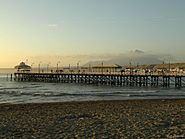 |
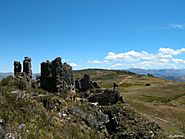 |
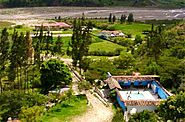 |
|||||
| Litoral Trujillano Huanchaco at Coast |
Andean landscape of Huamachuco Sierra |
Yanasara, Andes de La Libertad Sierra |
|||||
Water and Sanitation
The company responsible for providing water and sanitation services in the La Libertad Region is SEDALIB. This company is owned by the different municipalities (local governments) in the region.
Culture and Traditions
Festivals and Events
La Libertad is known for its vibrant festivals and events:
- Spring Festival: A colorful celebration held in Trujillo.
- Marinera Festival: This festival celebrates the Marinera, a traditional Peruvian dance.
- International Calzaferia El Porvenir: This is a fair focused on footwear. In 2012, it had its 10th event in the city of El Porvenir.
- Regional Fair of the Pineapple: This fair celebrates pineapples and is held in the town of Poroto.
- Virgin of La Puerta Patronal Feast: This celebration honors the Virgin of La Puerta. It started in 1664 when her image was placed at the entrance of Otuzco to protect against pirate attacks. The main day is December 15 each year. In 2012, the Peruvian government declared this feast a National Cultural Heritage.
- Contradanza: This is a special dance from the city of Huamachuco and nearby villages like Urpay. In 2012, the Peruvian government also declared this dance a National Cultural Heritage.
See also
 In Spanish: Departamento de La Libertad (Perú) para niños
In Spanish: Departamento de La Libertad (Perú) para niños



